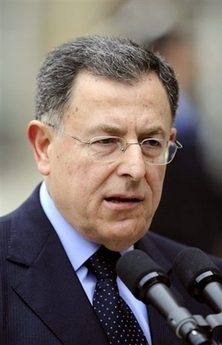 Lebanon’s prime minister accused Syria on Friday of blocking the election of a new Lebanese president and deepening the country’s 16-month political crisis through its interference in the country’s internal affairs. Fuad Saniora said Lebanon decided earlier this week to boycott this weekend’s Arab summit in the Syrian capital of Damascus because Beirut is usually represented by its president.
Lebanon’s prime minister accused Syria on Friday of blocking the election of a new Lebanese president and deepening the country’s 16-month political crisis through its interference in the country’s internal affairs. Fuad Saniora said Lebanon decided earlier this week to boycott this weekend’s Arab summit in the Syrian capital of Damascus because Beirut is usually represented by its president.
"The direct reason for not attending this summit is to assert that Lebanon is naturally represented, at any Arab summit, by its president," Saniora said in a televised speech addressed to the Arab leaders on the eve of their two-day summit that begins Saturday. Lebanon has been without a president since pro-Syrian President Emile Lahoud’s ended his term last November without a successor elected. Lebanon’s sharply divided parliament has failed to elect compromise candidate army commander Gen. Michel Suleiman as president because the anti-Syrian parliamentary majority and the Syrian-backed opposition remain deadlocked over the shape of the future government.
"It is regrettable that four months have passed with the vacuum in the president’s post … and Syria has played, during and before this period, a major role in deepening the political crisis in Lebanon," said Saniora, standing in front of a nearly a dozen Lebanese flags.
Saniora also accused Syria of blocking an Arab initiative to end the crisis, as well as efforts by the head of the Arab League to find a solution between rival Lebanese groups. He called on Damascus to "open a new page between the two countries."
Several Arab leaders, including those of heavyweights Egypt and Saudi Arabia, are not attending the summit to protest Syria’s policies in many parts of the region, including in Lebanon and the Palestinian territories.
Saudi Arabia and Jordan will be represented by their representatives at the Arab League, while Egypt has sent a minister of state as a head of its delegation.
Saniora urged Arab officials attending the summit to focus on the Syrian-Lebanese crisis and to call for an Arab foreign ministers meeting "as soon as possible" to solve disagreements between the two countries.
Anti-Syrian politicians accuse Syria of being behind bombings that killed dozens of Lebanese in the past four years, including the 2005 assassination of former Lebanese Prime Minister Rafik Hariri. Syria has denied the charges, but the killing led to local and international pressure that forced Damascus to end a 29-year military presence in Lebanon.



